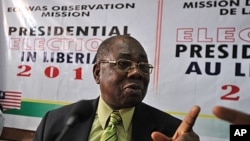Piracy, elections, and a food crisis are topping the agenda at the summit of the Economic Community of West Africa States, now underway in Nigeria's capital, Abuja. Heads of state are also to select a new chairman to replace Nigerian President Goodluck Jonathan.
Key issues at the ECOWAS summit include the worsening humanitarian situation in Sahel, piracy in the Gulf of Guinea, reform in Guinea-Bissau and upcoming elections in Senegal, Mali, Sierra Leone and Ghana.
Summit participants will elect a new leader of ECOWAS Friday, but for now the summit is presided over by Nigerian President Goodluck Jonathan.
The summit kicked off with a meeting of the ministerial level of the Economic Community of West African States, a regional economic coalition of 15 countries, on Wednesday.
Foreign ministers discussed political stability in Guinea-Bissau and pledged support to the country.
Nigeria's Minister of Foreign Affairs, Ambassador Olugbenga Ashiru, chaired the meeting and called for unity as ECOWAS goes forward.
"Unless we unite, and continue to speak with one voice, we are undermining the laudable achievements of our organization," said Olugbenga. "Furthermore, this disunity and breaking of ranks will destroy confidence and undermine the mutual beneficial assistance we render to ourselves. However, those who do not respect our unanimous decisions or respect our unity, should equally not be surprised when they are denied our solidarity when they need it most."
Ministers discussed the upcoming elections in Senegal and other countries in the region such as Mali, Sierra Leone and Ghana.
They also addressed the security situation in Mali and Niger related to terrorism and came up with recommendations to address the peace-keeping challenges faced in the region.
"To strengthen border controls to curtail the influx of small arms, drug trafficking and terrorist infiltration has become imperative," said Olugbenga. "This is exemplified by affiliations of terrorist groups in neighboring countries of our sub-region and beyond. Nigeria and indeed ECOWAS should continue to work against these terrorist groups and we will deny them safe havens in our respective states in order to nip them in the bud."
James Victor Gbeho, president of ECOWAS, said the coalition is doing tremendous work to maintain peace and security in the region, but added that the Tuareg rebellion in Mali and ongoing terrorist activity is a cause for great concern.
He said that more than ever before there is a need to present a united front.
"The security situation in the Sahel region continues to be of serious concern to the community," noted Gbeho. "In addition to the prevalent poverty in the region, ECOWAS has been confronted by three major developments - namely, the huge increase in circulation of small arms and light weapons in the area, mainly as a direct consequence of the post liberation military action in Libya in 2011; the return of many ECOWAS residents who had either been residents in Libya or were recruited by the Gadhafi regime into its military to help withstand the onslaught of the Libyan opposition forces, and the influx of refugees to neighboring states as a result of the conflict in Mali."
Gbeho urged foreign ministers to work closely together to bring peace, security and stability to the Sahel Sahara region in order to avert the spread of violence in Mali and other countries in the region.
ECOWAS Tackles Piracy, Elections, Food Crisis
- By Jane Labous




